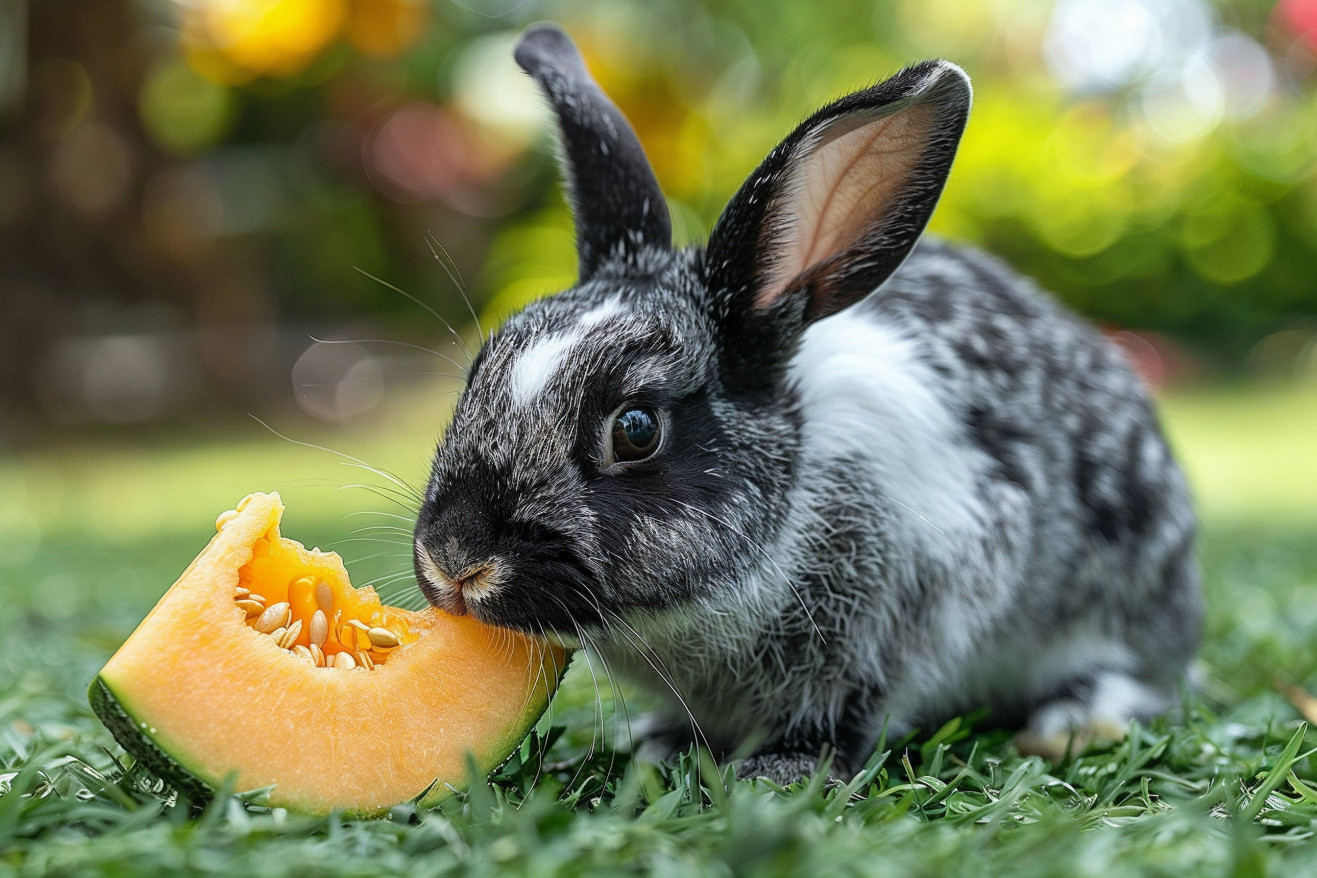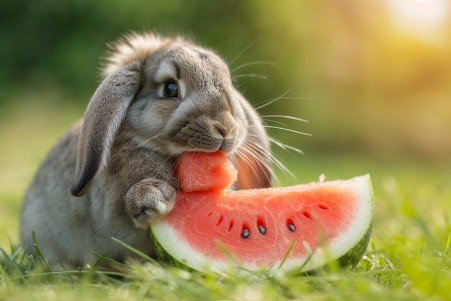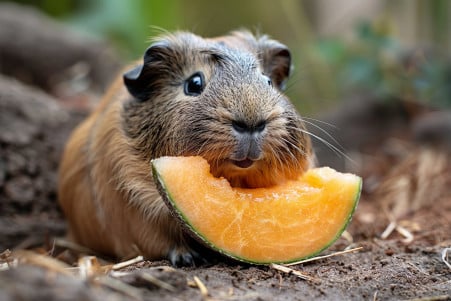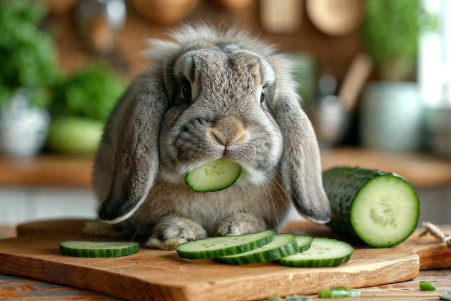Can Rabbits Eat Cantaloupe? A Guide to Safe Fruit Treats
15 March 2024 • Updated 15 March 2024

This article will cover whether or not rabbits can eat cantaloupe as a part of their regular diet. Rabbits can have cantaloupe as an occasional treat. You should limit their intake to 1 tablespoon per 2 pounds of body weight, and you can give it to them up to two times a week.
Make sure to remove the seeds and cut the cantaloupe into small pieces to prevent choking and to make sure they don’t eat too much sugar.
This article will take a comprehensive look at the topic, covering everything from information from veterinarians to nutritional data to studies on rabbit diets. By looking at these different angles of rabbit health and nutrition, we’ll cover exactly how cantaloupe can be part of a rabbit’s diet, the nutrients it provides, and the potential downsides that can be avoided with the right care.
You’ll finish the article knowing exactly how fruits like cantaloupe can help you keep your rabbit happy and healthy.
Can rabbits eat cantaloupe?
Nutritional Benefits and Concerns of Cantaloupe for Rabbits
In moderation, cantaloupe can offer rabbits a number of nutritional benefits as a sweet snack. It is a good source of vitamins, particularly vitamin A from beta-carotene and vitamin C, which are both important for a rabbit’s overall health. Cantaloupe also contains important minerals like potassium and is high in water, which can help rabbits stay cool and hydrated, especially in the summer, according to rabbits.life.
Cantaloupe also contains fiber, which is good for a rabbit’s digestive system and can help maintain a healthy gut. However, it’s important to note that cantaloupe is high in sugar. Because of this, both rabbits.life and Rabbit Care Tips caution that rabbits should only be given cantaloupe in small amounts, as the sugar in the fruit can cause digestive problems and obesity.
As a result, experts recommend that rabbits be given no more than one tablespoon of cantaloupe for every two pounds of body weight and that they be given this amount no more than twice a week. This way, rabbits can enjoy the nutritional benefits of cantaloupe without the risks of eating too much of it.
The Rabbit’s Cecum and Cecotrophy
Rabbits are hind-gut fermenters, and their digestive system is highly efficient at breaking down fibrous plant material. According to Purina Animal Nutrition, the rabbit’s cecum is critical to this process. The cecum, which is part of the digestive system, houses the microbes necessary for fermenting and digesting fiber.
This not only underscores the need for a diet high in fiber to support their normal digestive functions but also shows how fiber is necessary to support the health of these important cecal microbes.
One of the most unique aspects of a rabbit’s diet is cecotrophy, or the consumption of cecotrophs, nutrient-rich fecal pellets. According to Supreme Petfoods, when rabbits eat cecotrophs, they are essentially recycling nutrients, making sure they get every last bit of nourishment out of their food. This is important because it’s the way that rabbits get the vitamins and amino acids that are produced during cecal fermentation.
When it comes to fruits like cantaloupe, the key is to make sure that rabbits eat it in moderation. While rabbits can benefit from the hydration and nutrients that cantaloupe provides, the cornerstone of their diet should be high-quality fiber from hay and grasses, according to veterinary experts like Supreme Petfoods.
Fruits should be added to the diet carefully to make sure that the rabbit’s digestive system, which is set up to process a high-fiber diet, isn’t thrown out of whack. By doing this, rabbits can get the benefits of a varied diet without putting their digestive health at risk.
How to Make Sure Your Rabbit’s Diet Is Healthy with Cantaloupe
Knowing what your rabbit needs in its diet is important for its health. The Merck Veterinary Manual explains that a rabbit’s diet should consist mainly of hay, a variety of fresh vegetables, and a small amount of pellets.
Hay is especially important because it’s high in fiber, can be used as a staple food, and can help with dental and digestive health. Fresh vegetables can provide important vitamins and minerals, and pellets can help supplement a rabbit’s diet.
This is where treats like cantaloupe come in. BeChewy explains that cantaloupe can be given to rabbits, but it should be given in moderation because of its sugar content. They recommend that rabbits have no more than a level tablespoon per two pounds of body weight per day.
Whenever you introduce a new food, especially something like cantaloupe, it’s important to do so slowly and monitor your rabbit’s reaction to make sure it doesn’t cause any digestive issues.
Arizona Exotics also notes that it’s important to work with your vet to make sure your rabbit’s diet is healthy, especially when you’re adding new treats. This way, you can make sure that any dietary additions, including cantaloupe, are good for your rabbit’s specific health needs.
While cantaloupe can be a fun addition to your rabbit’s diet, the most important thing is to make sure that you’re feeding it a healthy diet that includes hay, fresh vegetables, and close monitoring.
How to Tell If Your Rabbit Is Having Health Issues from Eating Cantaloupe
While cantaloupe can help keep your rabbit hydrated, it’s important to remember that it should be fed in moderation to avoid any potential health issues.
According to Rabbit Care Tips, signs of digestive upset due to eating too much cantaloupe can include changes in droppings, such as diarrhea or fewer fecal pellets. These symptoms are often due to the high sugar and water content in cantaloupe and can be a sign that the rabbit’s digestive system is out of whack.
In addition to these digestive issues, obesity and dental problems are also potential risks when feeding rabbits sugary fruits like cantaloupe. Since rabbits’ teeth grow continuously, the sticky sugars in cantaloupe can lead to dental decay. Meanwhile, the calorie density of sugary fruits can lead to weight gain, which can cause a variety of health problems.
While it’s rare, some rabbits may also be allergic to or intolerant of cantaloupe, which can lead to skin problems or more digestive issues. In addition, while cantaloupe seeds aren’t toxic, they can be a choking hazard, so it’s best to remove them from the fruit before feeding it to your rabbit.
If your rabbit shows signs of being unwell, such as lethargy, ongoing digestive issues, or signs of an allergy after eating cantaloupe, stop feeding it to them and consult your vet for advice on how to best care for and feed your rabbit. Your vet can take into account your rabbit’s breed and any predispositions to digestive issues, as noted in a study published by PMC, when making their recommendations.
Final Word on Rabbits and Cantaloupe
In summary, cantaloupe can be a tasty and refreshing snack for rabbits as long as it is given in moderation. The most important thing to remember when feeding your rabbit is to make sure their diet is balanced and diverse.
As Rabbit Advocates and the RSPCA both point out, a rabbit’s diet should consist of unlimited hay and fresh water, supplemented by a variety of fresh vegetables. While cantaloupe is a good source of vitamins A and C, it is high in sugar and should be considered a small, occasional treat.
It is important to reiterate that moderation is key; a good rule of thumb is no more than a tablespoon per two pounds of body weight, and no more than twice a week. As Protexin Vet notes, it’s best to introduce new treats like cantaloupe slowly and keep an eye on your rabbit for any adverse reactions.
If you are unsure about what to feed your rabbit, it is always a good idea to consult with a vet to get a personalized recommendation. By maintaining this careful balance, you can ensure that your rabbit can enjoy the occasional sweet treat like cantaloupe while also supporting their overall health and well-being.
Remember that rabbits are healthiest when they eat a diet that is primarily made up of hay and greens, with treats like cantaloupe playing a secondary role.


